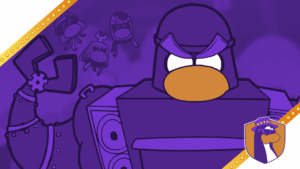AI’s implementation has sparked controversy across modern society, leaving the army community standing at a crossroads. While its potential to enhance army operations is undeniable, we must carefully explore the hidden consequences of this technological revolution. What we stand to lose may prove more valuable than what we gain.
The AI Dilemma
In my previous editorial, I explored AI’s transformative potential for Club Penguin Armies, from army leadership to league departments. Today, we examine the other side of this technological revolution. While artificial intelligence offers undeniable efficiencies, its implementation comes with complex trade-offs that demand our attention. This follow-up isn’t a retraction, but a necessary exploration of how we might harness these tools without compromising what makes our community special. The same innovations that promise streamlined operations also raise profound questions about authenticity, fairness, and the very soul of army culture.
The Ethical Minefield of AI Implementation
The integration of artificial intelligence in armies can bring us complex ethical challenges. There is no question that AI can certainly serve us dramatically across various departments and fields that are more technical, processing complex procedures. It is a powerful tool that can enhance human capability. However, in more human-centric domains, which the army community mainly concentrates on, AI-generated content fundamentally undermines authenticity and the very reason we are all here in the first place.
When an artificial algorithm is trained to generate a written post, graphic design or even an event tactic, it lacks the lived experience, emotional nuance, and deliberacy that truly define meaningful human creation. Additionally, its implementation can raise intellectual property concerns. Systems trained on community creations without proper permission essentially repurpose members’ original work. AI also has the potential to entirely remove the factor of accountability, despite being accurate and efficient (most of the time). How does one appeal a decision made by nothing but opaque algorithms?
These systems function as inscrutable “black boxes”. Unlike human decisions that can be questioned, algorithmic judgments arrive without explanation. More worryingly, these systems risk perpetuating hidden biases if trained primarily on data from historically dominant armies like the Rebel Penguin Federation or the Army of Club Penguin.
What begins as assistance threatens to become cultural erasure, prioritising efficiency over the human mannerisms that make our community what it is.
The Erosion of Authenticity
To introduce things, I wish to share a revealing experience that illustrates this concern. On the first episode of the Penguin Ponderers podcast, featuring BscharBach2, we were able to unknowingly expose a frightening reality: perfect impersonation. We placed him in a segment where he had to distinguish between the writing of a certain army figure and a mimic of it, generated purely by a couple of prompts presented to AI.
This display exposed more than just technological advancement; it revealed an existential threat to our community’s foundation of trust. When a perfectly written report post could equally be the work of AI or a passionate reporter, the very meaning of our interactions in armies becomes unstable. Many human traces lose their significance when they can be flawlessly counterfeited.
Authenticity isn’t just about truthfulness, but about preserving the human imperfections that create connection. The typos while hyping pre-battle, the inside jokes woven within tactics, these “flaws” are the fingerprints of genuine engagement. Yeah, AI has the potential to generate some graphics, but can it replicate the intricacies of a hand-drawn work of art?
The Perfection Paradox
The danger isn’t that AI content will be noticeably inferior, but that it will be indistinguishable from the real thing. This leaves us questioning whether we are consuming content produced by a person or a simulation. In fact, you probably missed the AI-written sections in my previous post. That’s how convincing it’s become.
As AI spreads through our community, we face hard questions. What happens when tactics come from algorithms? When posts are machine-written? When max counts are calculated by a trained system? Where does that leave the human passion that built CPA? What remains of the community we love?
As we stand at this technological crossroads, the path forward demands careful consideration. AI offers undeniable efficiencies, yet threatens to erode the very human connections that give our community meaning. The question isn’t whether we’ll adopt these tools, but how we’ll preserve what makes CPA special amidst this transformation. Will we become more productive at the cost of our authenticity? Can we harness AI’s potential without losing our humanity? And ultimately, when every interaction could be algorithmically enhanced, what remains genuinely ours?
Diwix
Editor in Chief
